Have you ever wished that you could leave this world? Because the suffering was so huge that you didn’t want to have to bear it for a second longer. Because you thought that the pain would tear you into so many tiny pieces. But you’re still whole. You just don’t have a home anymore. No family anymore. No friends anymore. “And I haven’t managed to freeze to death yet either,” says Heinrich as he points to the place where he sleeps. Heinrich is homeless and currently lives close to the railway tracks by the River Wien.
It’s minus four degrees Celsius. I’m wearing nylon tights with wool tights over the top, and then jeans. Two scarves. It’s bitterly cold on this January evening. I’m in Hütteldorf, standing under the motorway bridge by the River Wien. This is where homeless people come to seek shelter. The bridge’s retaining walls keep the wind at bay and offer a little protection. A small, elderly man stands a few metres away from me. He’s wrapped up in a thick ski jacket and smoking a cigar. I’m not sure if he’s actually homeless or not. At this distance, it doesn’t really look like he is. He’s appropriately dressed and not carrying any bags. I go and speak to him anyway. He’s talkative, and almost sings as he introduces himself. Up close, I see that his teeth are bad and he seems a little confused. Quite quickly, it transpires that he does in fact live on the streets. Heinrich is 62 years old. This is the first time I’ve spoken to a homeless person. I approach the conversation cautiously, but talking to him turns out to be easy.
Here, way out in Hütteldorf by the “concrete pergolas” along the River Wien, the icy wind whistles (despite the retaining wall) through the brick-lined passage where joggers and cyclists share the bike path. Fat pigeons sit in the hole-pocked walls. Cars whizz past. My fingers freeze as I hold up the voice recorder.
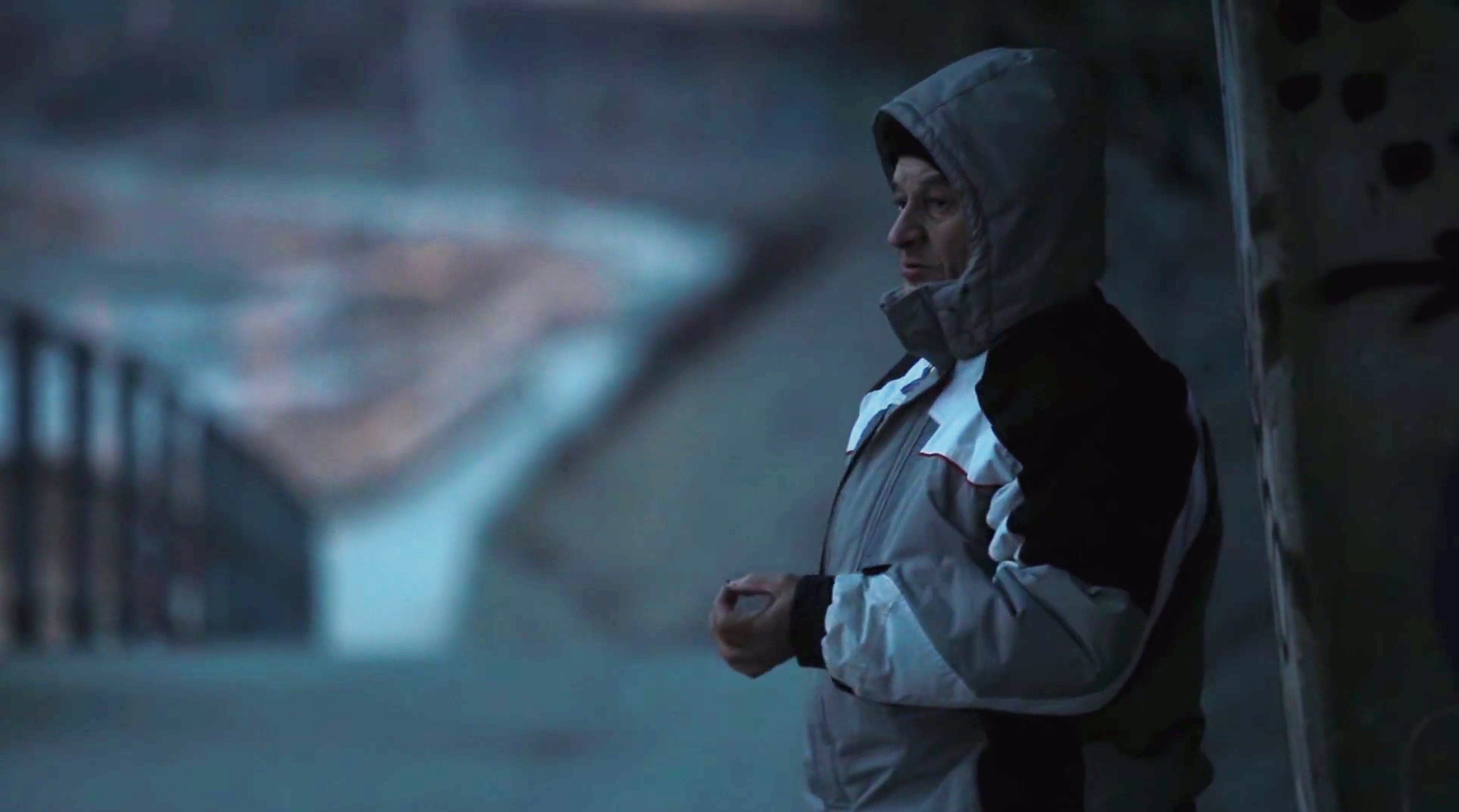
A hideaway for homeless people: Heinrich under the motorway bridge on the River Wien in Hütteldorf. Photo: © Yvonne Widler
Heinrich says his family threw him out. He tells me about the scheming brother who cheated him out of his inheritance. Heinrich’s grey-blue, slightly bloodshot eyes shine when he talks about his mother and the schnitzels she used to make. He reminisces about his ex-wife, with whom he built a house. He says he’s been in prison a few times, and tells me about his many trips abroad and wild times on Austria’s country roads. Nowadays, he says, he eats his sandwiches at Vienna’s abbeys with dignity and pride. He tells me about Karl, who let Heinrich have his vanilla pudding today. Heinrich says he’s been homeless for more than 15 years. It takes him a moment to calculate; the years go by so quickly. “I’ll never forget the first soup I ate in a night shelter.”
He tells me about his son, who is a nurse and with whom he has no contact whatsoever: “I might be an idiot, but I’m not stupid enough to harm other people.” He says that both his parents are dead, and that he only recently lit a candle at his father’s grave. He talks about his appointed guardian, with whom he is extremely unsatisfied. She tells him that she can’t get along with people like him.
How do you survive?
Heinrich is no stranger to spending winter outside. “I’ve lain in the snow here,” he says as he points to the place where he sleeps. “How do you survive that?” I ask him. “With medication. When it’s really cold, I go to the emergency pharmacy and get something for the pain. I always make sure I’ve got the eight euros on me. And because it’s so good to be alive, I sometimes treat myself to a little escape.” He holds up a plastic bottle filled with wine. Heinrich says he’s often wished that he could leave this world. But whenever he’s reached a point where he could just let go, he didn’t do it. “There are still nice things in my life. But it took me a long time to see them.”
You travel back to your warm home and you know that the old man will be sleeping out in the freezing cold.
I ask him if there’s anything specific he urgently needs. Something that I could bring him the next time I come. He pauses for a moment, takes a deep breath and then blurts it out: “A chocolate Santa and bananas. They’re treats that last. You can enjoy them for so long.” I wasn’t expecting that.
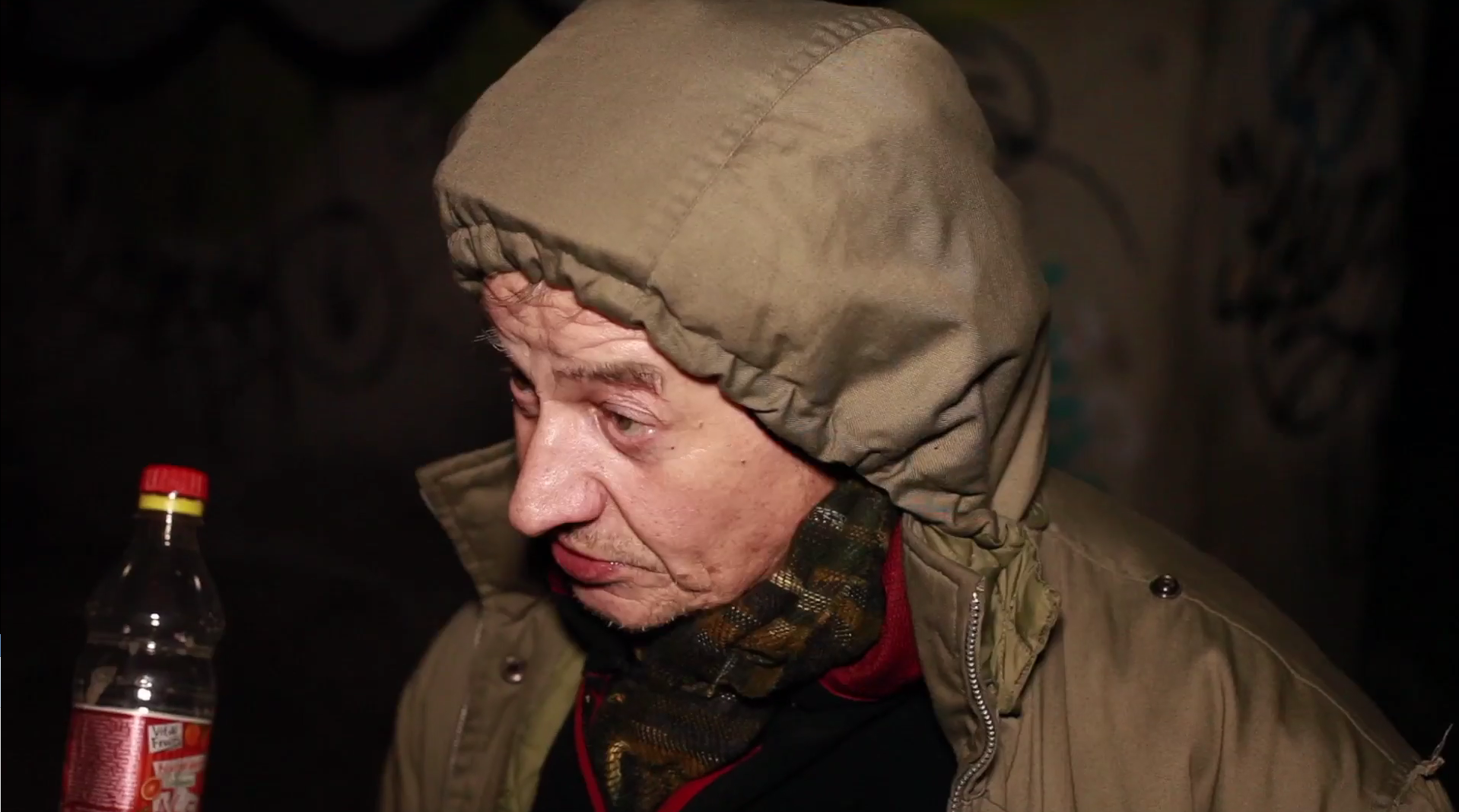
Heinrich knows the cold season outdoors. Photo: © Yvonne Widler
After a meeting like that, you go away with a strange feeling. You travel back to your warm home and you know that the old man will be sleeping out in the freezing cold. Heinrich only goes to a night shelter if he absolutely has to. He likes to be alone.
The Journalism Award “from below”
The Journalism Award “from below” for respectful poverty coverage was created in 2010 as a project of the Austrian Anti Poverty Network. It is aiming to promote a kind of journalism which reflects the many facets of poverty, treats people concerned in a respectful way, allows their voices to be heard, lets their realities become visible and examines the societal causes of poverty. The prize “from below” is designed by people experiencing poverty and by journalists. The jury exclusively consists of people experiencing poverty.
Since 2015, with the support of the ERSTE Foundation and the EAPN (European Anti-Poverty Network), an international dissemination of the prize has been in progress and workshops have been organised. Most recently, the Journalism Award “from below” was presented for the first time in Hungary, Croatia, Finland and Iceland. This article by Yvonne Widler was awarded in the online category in 2016.
When you work with homeless people, you never know, at the point in time where you say goodbye, whether you will ever see them again. They rarely have a telephone or a fixed place where you can be sure of finding them. So I just keep going back to Hütteldorf in the hope of finding Heinrich again. After my third unsuccessful attempt, I leave him a note with a time and a meeting point for next week. I also hide a bag there, full of the things he asked for when we last met – and some things that I think might prove very useful.
A week later, I’m back at Heinrich’s sleeping spot. Suddenly, I hear his voice. He’s singing an old song that I don’t know. As he approaches, he asks me to sing along. I ask him whether he found the bag I left hidden for him. “Of course. I’ve polished everything off already,” he says. I’ve brought another chocolate Santa with me this time, too. Before I even finish taking it out, he snatches it from my hand. “Thanks so much, young lady.” He hardly has any teeth left so he has to suck the chocolate Santa – which, he says, he actually dreamt about.
His sleeping spot is filled with piles of old clothes. Even women’s and children’s clothes are lying around. He uses them to cover faeces. “There’s also mice under there,” he giggles. He keeps his documents with him at all times, in a dark blue cloth bag.
Outreach work on the streets
The colder it gets, the busier the night shelters become. The Gruft [a shelter in Vienna run by Caritas] installed bunk beds in September 2014. Now people don’t have to sleep on the floor on mats anymore. But just two years ago, it got so crowded in winter that people were even sleeping in the showers.
I join Susanne Peter, a Caritas social worker, and her colleague on a night of outreach work. I meet them in the Gruft. The winter evening is cold and the shelter is busy. Some of the people are in very poor health. Many are mentally ill, and are shouting or screaming. The others are expected to show understanding. It’s a delicate situation.
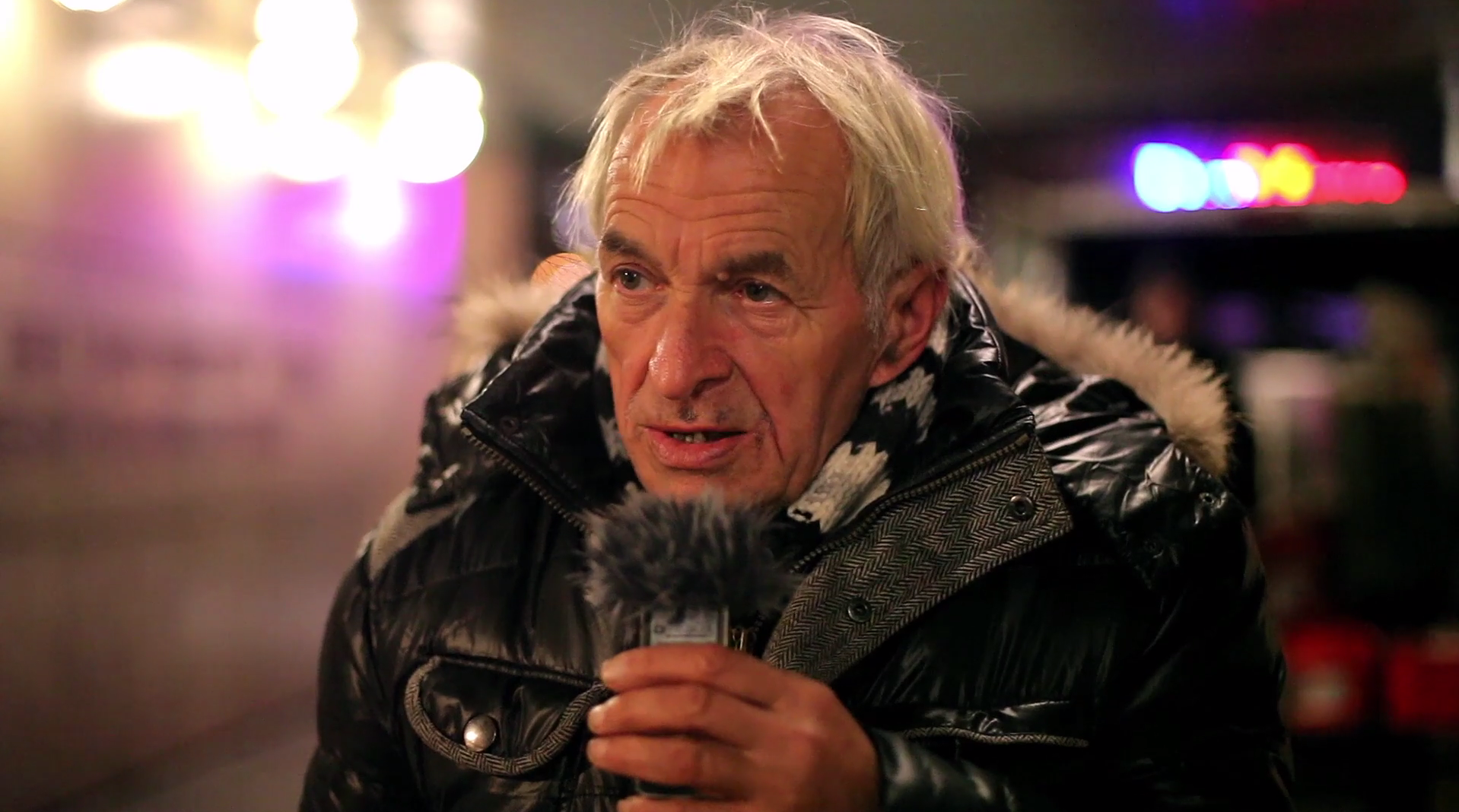
Otti. Photo: © Yvonne Widler
Outside, the temperature is below freezing again. The two women are carrying winter sleeping bags and thick socks. In retrospect, one of the first questions I asked Susanne was probably one of the most naïve I ever put to her. Still, it’s a question that we’ve all probably wondered about: “Doesn’t every homeless person want to be in the warm when it’s cold outside?” Isn’t it better to sleep in an overcrowded night shelter than outside in the snow?
To answer this question, you first have to forget everything you think you know about homeless people. As we make our way to our first client – Herbert – Susanne tells me the stories behind some of the homeless people she has met.
She tells me about an old woman who has been living in the forest close to Neuwaldegg for over a decade. The woman has no money, no income of any kind. For ten years, she’s been surviving on what she finds in rubbish bins and what she gets from parishes and passers-by. Making contact was extremely difficult. The woman was frightened of Susanne and wouldn’t speak to her. If Susanne approached her, the woman would start screaming. After six months, Susanne finally found out the woman’s name. Then she applied for a guardian for her. “At the moment, there are lots of homeless people out there who we just don’t know. They’re living in forests or condemned buildings.”
Susanne then tells me about a man who hadn’t showered for nine months – ever since he’d lost his home. After countless conversations, she managed to convince him to come to the Gruft for a wash and a change of clothes. He was extremely ragged. Most people feel better when they’re clean. But not this man. He was in a very bad way afterwards. He had lost the identity that his old clothes had given him. “These people often react in a way that we can’t fully understand. But for them, it’s logical.”
She talks about a 28-year-old man who has been living on the streets for 12 years and suffers from severe depression. About people with open wounds infested with maggots. Even if a person has an Austrian health-insurance card, the shame involved in visiting a doctor is often much too great.
Susanne tells me about a homeless woman who spends her days cleaning telephone boxes. Any attempt to approach her led to her shouting and pleading to be left alone. For a year, Susanne kept going back to the woman and tried everything she could to make contact. Finally, she managed to start a conversation about cleaning products, and that was the start of their relationship.
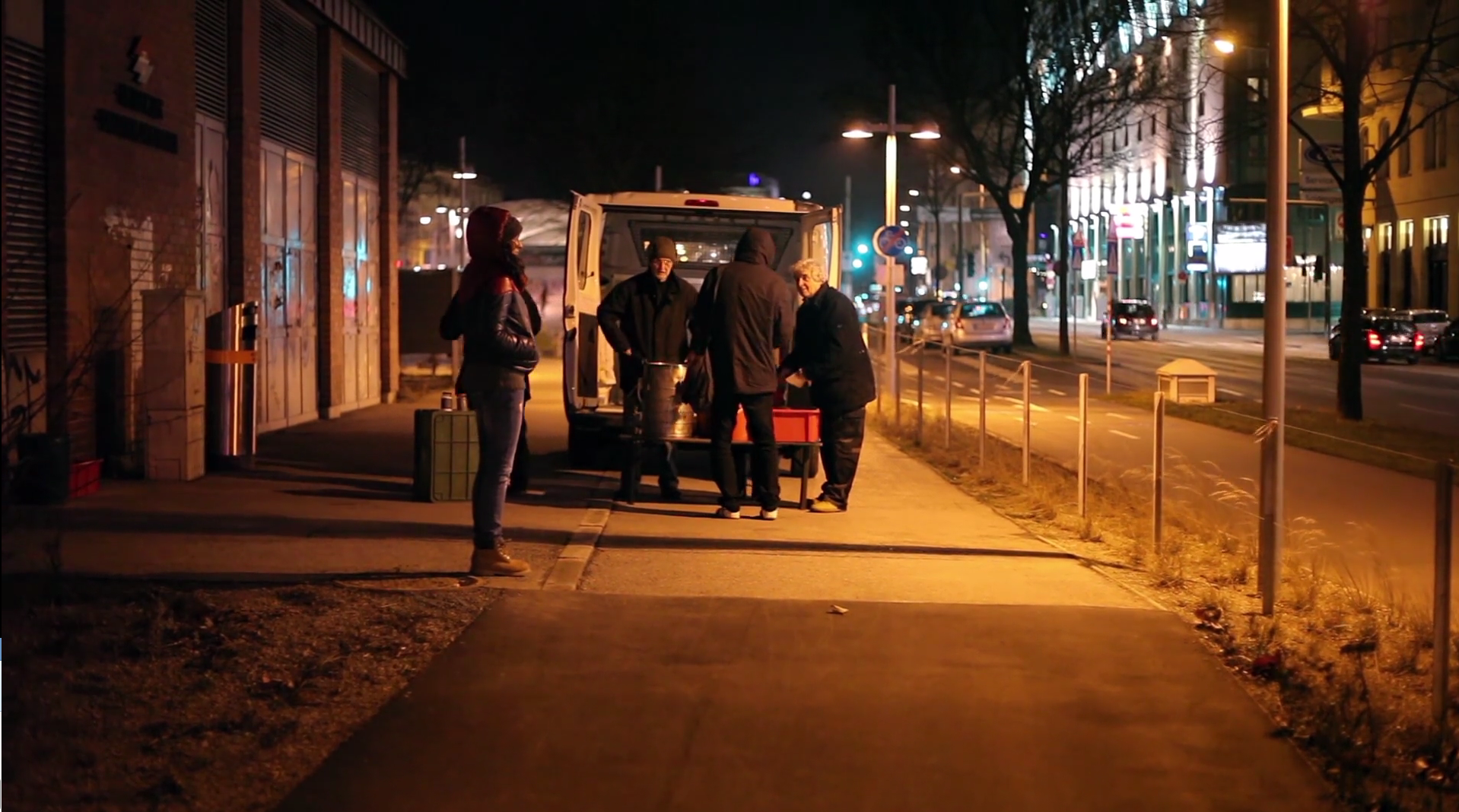
Food distribution at Neubaugürtel. Photo: © Yvonne Widler
Many of these people are incapable of accepting help. They no longer trust anyone, or are mentally unable to do so. “Clients often start out by saying that they’re doing fine. That they like being on the streets.” But Susanne knows that’s not true. Not for any of them. They simply cannot imagine living a “normal” life. “For someone who’s been living in a toilet for years, that’s simply inconceivable. It takes a lot of time and patience to see how best to approach people and when the time is right for a change. Trust is a big factor.”
Some homeless people never had a foothold in life. They grew up in care homes and without families. They had traumatic experiences at a young age and must now bear the trauma of being homeless. But the streets are also increasingly filled with people who were in business but went bankrupt. These days, homelessness often affects those who were once wealthy, but lost everything when their fortunes took a turn for the worse.
No sense of freezing to death
Recent years have seen an increase in mental illness among homeless people. “We’re seeing that it’s a big issue. That’s why we now bring psychiatrists when we do outreach work at night, and go looking for people who need that kind of help,” explains Klaus Schwertner, secretary general of Caritas. He says that it’s important to work with the police and a medical officer to establish when someone is in danger, because these people cannot gauge when they are about to freeze to death. Austria has laws allowing officials to take people like this into shelter against their will.
“A person who cannot practise regular personal hygiene and hasn’t slept properly can hardly go to work.“
Susanne has lost count of the number of times she’s heard that homeless people are just work-shy alcoholics who are lazy and only have themselves to blame for their situation. Surely you could get off the streets if you really wanted to. She just shakes her head. “A person who cannot practise regular personal hygiene and hasn’t slept properly can hardly go to work. And on top of that, homeless people can’t do anything in private. We drink our beer on the couch in front of the TV in the evening. They drink theirs on the park bench. Not everyone’s an alcoholic.”
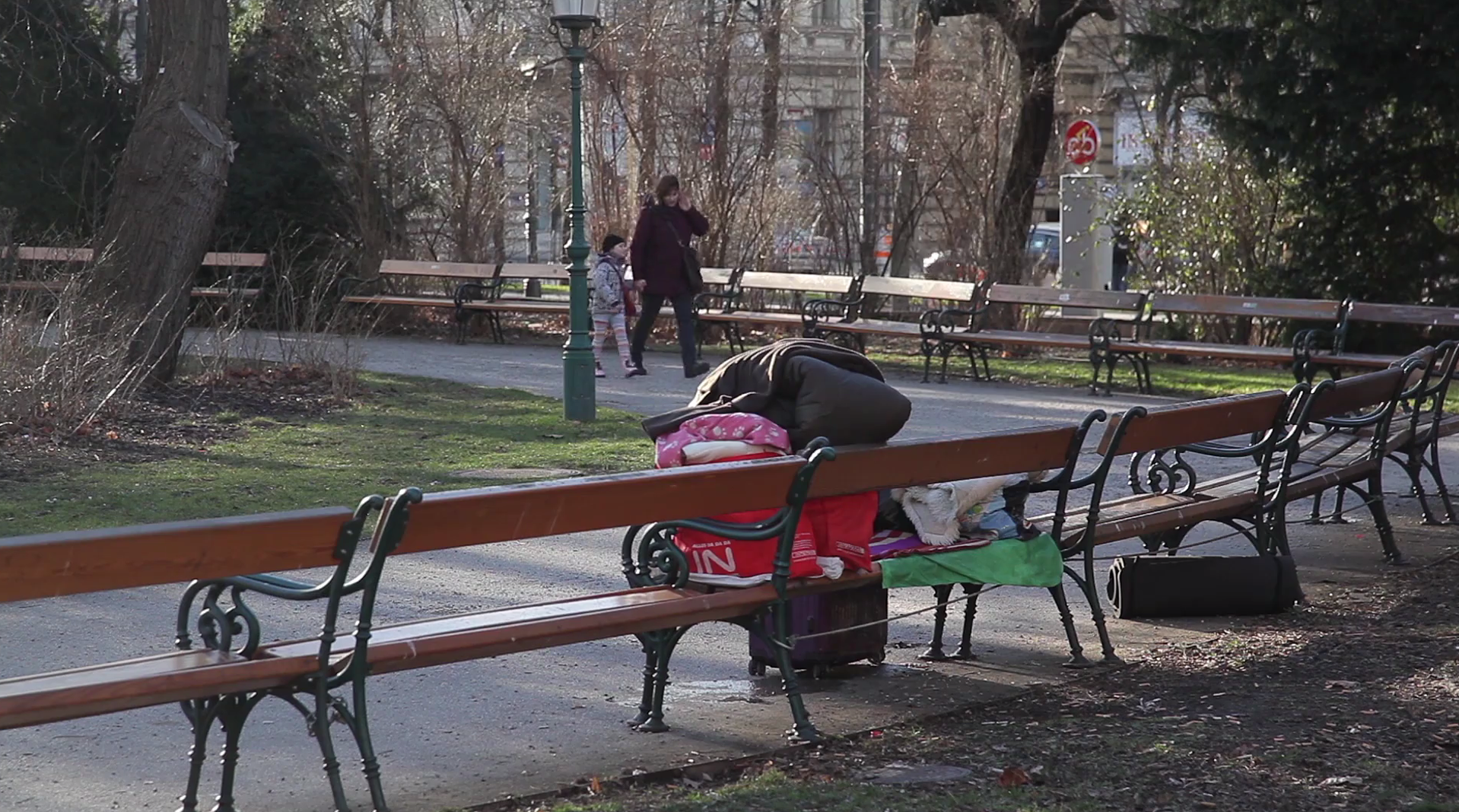
Photo: © Yvonne Widler
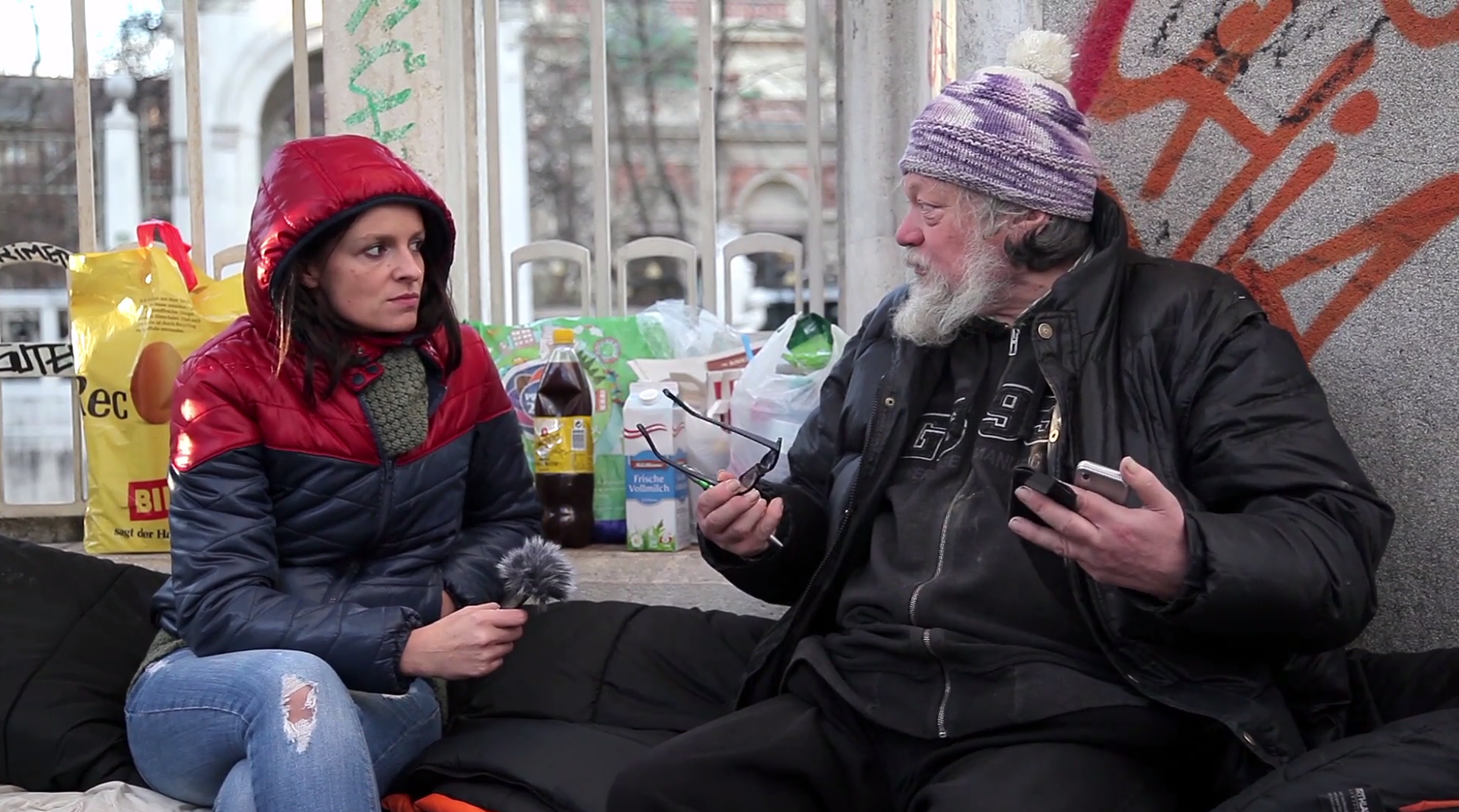
Yvonne Widler with Fred in the Stadtpark. Photo: © Yvonne Widler
The cold is draining. Herbert is 64 years old. He’s well aware that things can’t go on like this. Herbert knows a lot of homeless people. “There’s no shame in it. You can end up like this very quickly,” he says. And then you land in a homeless hostel. “The worst thing is when your children visit you. The fathers would cry bitterly because they were so ashamed,” he recalls. Herbert is someone who you can talk to. Someone who accepts help after a while. Susanne is currently looking for a place in supported housing for him. It’s the second attempt to help Herbert transition back into normal life. The first attempt failed.
Perception and reality
I’ve also heard a lot of stories from homeless people. Stories about their lives, all the places they’ve been, what jobs they’ve done, how rich they once were. Some of the stories are full of inconsistencies. But most of the time it doesn’t matter whether they are true or not. “If clients say they experienced something, then they really feel like they did, so they actually had that experience. It’s irrelevant whether it reflects our reality or not. It reflects theirs,” says Susanne.
The last time I meet Heinrich, he’s back standing in his concrete pergola by the River Wien. This small man looks up at me and says, very calmly, “I’m a loser. Now here I am, a poor wretch, all alone.” Then the corners of his mouth curl up and he smiles at me: “Your parents must be proud of you, young lady.” I smile back and ask him what his hopes are for the new year. “That things get easier and I get healthier. That things get better with my circulation, blood pressure and cholesterol. That I get it all under control with the medication from the Caritas bus.” Then he pops a big piece of chocolate Santa into his mouth, as happy as a child with this treat that gives him such joy for so long.
Original in German. First published on 10 January 2016 on NZZ.at.
Translation into English by Jen Metcalf.
This text is protected by copyright: © Yvonne Widler. If you are interested in republication, please contact the editorial team.
Copyright information on pictures, graphics and videos are noted directly at the illustrations. Cover picture: Fred. Photo: © Yvonne Widler.
A trip through poor Vienna
There are no figures. We simply don’t know how many people are homeless in Austria. The most recent official data are from 2006, and they show that some 37,000 people received support as part of the Assistance to the Homeless programme. We went out onto the streets to talk to homeless people. The result is a documentary that gives insight into their thoughts and suffering, but also into the pleasures they find in life.
What happened after filming?
Heinrich is still living on the streets. Unfortunately, efforts to find him a place to stay were unsuccessful. The social worker who looks after him describes him as “difficult to reach”, because he frequently changes (or is forced to change) his whereabouts.
Otti moved into a socially assisted home in April. Even though the film showed him saying that a good friend had offered him a place to stay and that everything was fine, he was clearly overjoyed to have his own home.
Fred eventually got to the point where his homelessness became dangerous to his health. He couldn’t cope any longer. After years of living on the streets, he finally turned to the social worker for help. Today, he has the “job” he talked about in the film. He can take his notes there, and he is getting used to living in a small flat in an assisted living community. He was especially happy about an old laptop that Caritas gave him.
Meanwhile, Herbert got a flat but lost it again. The attempt to integrate him failed this time. His social worker’s next step will be to try and find him a place that offers continuous assistance to help him integrate. “We have to start all over again,” says Susanne Peter from Caritas.
Diana’s situation remains unchanged. She still calls the Gruft her home. She still has her family there, she says. For her, the Gruft means security. It is difficult to say whether Diana will ever be capable of holding down a job. Right now, her mental state means she is not in a position to do so.
